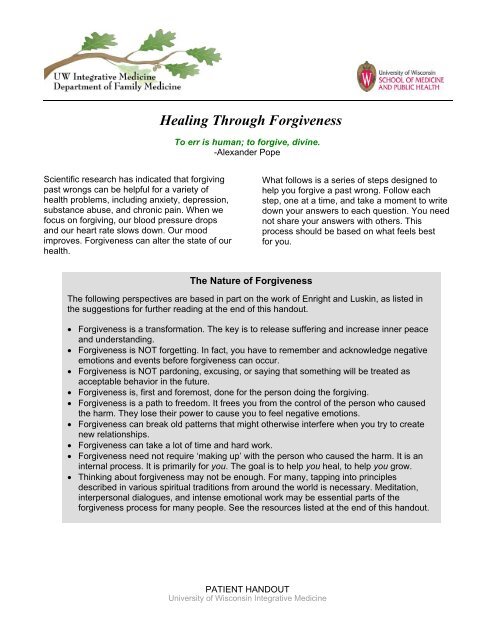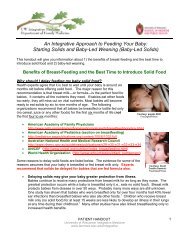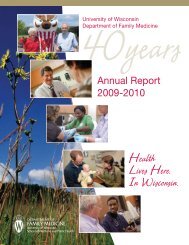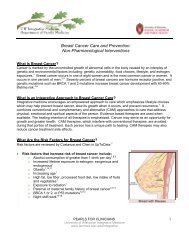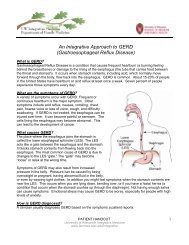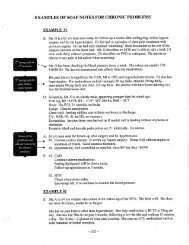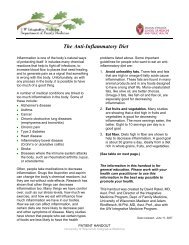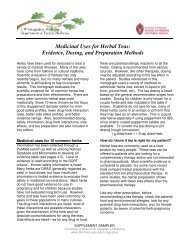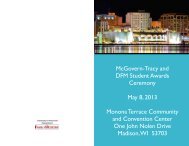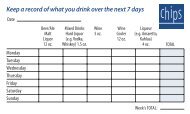Healing Through Forgiveness - UW Family Medicine - University of ...
Healing Through Forgiveness - UW Family Medicine - University of ...
Healing Through Forgiveness - UW Family Medicine - University of ...
- No tags were found...
You also want an ePaper? Increase the reach of your titles
YUMPU automatically turns print PDFs into web optimized ePapers that Google loves.
<strong>Healing</strong> <strong>Through</strong> <strong>Forgiveness</strong>To err is human; to forgive, divine.-Alexander PopeScientific research has indicated that forgivingpast wrongs can be helpful for a variety <strong>of</strong>health problems, including anxiety, depression,substance abuse, and chronic pain. When wefocus on forgiving, our blood pressure dropsand our heart rate slows down. Our moodimproves. <strong>Forgiveness</strong> can alter the state <strong>of</strong> ourhealth.What follows is a series <strong>of</strong> steps designed tohelp you forgive a past wrong. Follow eachstep, one at a time, and take a moment to writedown your answers to each question. You neednot share your answers with others. Thisprocess should be based on what feels bestfor you.The Nature <strong>of</strong> <strong>Forgiveness</strong>The following perspectives are based in part on the work <strong>of</strong> Enright and Luskin, as listed inthe suggestions for further reading at the end <strong>of</strong> this handout.• <strong>Forgiveness</strong> is a transformation. The key is to release suffering and increase inner peaceand understanding.• <strong>Forgiveness</strong> is NOT forgetting. In fact, you have to remember and acknowledge negativeemotions and events before forgiveness can occur.• <strong>Forgiveness</strong> is NOT pardoning, excusing, or saying that something will be treated asacceptable behavior in the future.• <strong>Forgiveness</strong> is, first and foremost, done for the person doing the forgiving.• <strong>Forgiveness</strong> is a path to freedom. It frees you from the control <strong>of</strong> the person who causedthe harm. They lose their power to cause you to feel negative emotions.• <strong>Forgiveness</strong> can break old patterns that might otherwise interfere when you try to createnew relationships.• <strong>Forgiveness</strong> can take a lot <strong>of</strong> time and hard work.• <strong>Forgiveness</strong> need not require ‘making up’ with the person who caused the harm. It is aninternal process. It is primarily for you. The goal is to help you heal, to help you grow.• Thinking about forgiveness may not be enough. For many, tapping into principlesdescribed in various spiritual traditions from around the world is necessary. Meditation,interpersonal dialogues, and intense emotional work may be essential parts <strong>of</strong> theforgiveness process for many people. See the resources listed at the end <strong>of</strong> this handout.PATIENT HANDOUT<strong>University</strong> <strong>of</strong> Wisconsin Integrative <strong>Medicine</strong>
<strong>Healing</strong> <strong>Through</strong> <strong>Forgiveness</strong>1. Think <strong>of</strong> a person who has wronged you,someone who you have not been able orwilling to forgive thus far.2. Describe the experience or experiences inwhich this “<strong>of</strong>fender” harmed you or treatedyou unjustly.3. Describe the emotions you feel as youconsider these events. Do you feel anger?Shame? Guilt? How much time do youspend thinking about or re-living whathappened? Take as much time as you needto acknowledge your feelings andexperiences and put them into words.4. How has being unable to forgive affectedyour health? Has it affected your ability torelate to others? Did it change your view <strong>of</strong>the world? How has being hurt in the pastcaused you to protect yourself? Does howyou defend yourself limit you in any way?5. What are the benefits <strong>of</strong> forgiving?6. Are you ready and willing to forgive? Whenyou feel that the answer is “yes,” continuewith the steps described below. Sometimesjust deciding to forgive is the most difficultstep <strong>of</strong> all!(Note: The following guidelines/suggestions are inspired by the workslisted in the “Further Reading” section atthe end <strong>of</strong> this handout. Follow the stepsin whatever order works best for you.)7. Consider a situation in which another personhad to forgive you for something. How didyou feel? Recognize that everyone isinvolved in both forgiving and being forgiven.If you put yourself in the position <strong>of</strong> theperson who hurt you, can you understandwhy they did what they did? (Again,understanding it does not mean you feel itwas an acceptable thing for them to do.)8. Offer support to others who are in a similarsituation. Helping others who have beensuffering can help you move through yourown painful experiences. You might considerperforming an act <strong>of</strong> kindness toward theperson who hurt you, but anything you do tohonor your decision to forgive is important.Do what feels right to you.9. Replay in your mind the situation when youwere hurt. What can you learn from it aboutyourself? What does it mean to you? Defineyour relationship with the person who hurtyou on your terms. Break any harmfulconnections.10. Release the emotions that this hurt hascaused you. Express those emotions andthen move through them, so that they will nolonger cause you to waste energy on them.Ask for support from friends or familymembers as you do this.11. For additional insight and assistance,consider discussing these issues with ahealth pr<strong>of</strong>essional (counselor,psychologist, physician) and/or referring tothe books mentioned below.PATIENT HANDOUT<strong>University</strong> <strong>of</strong> Wisconsin Integrative <strong>Medicine</strong>
<strong>Healing</strong> <strong>Through</strong> <strong>Forgiveness</strong>Additional perspectives on forgiveness from the readings listed below:From GG Jampolsky, MD:• <strong>Forgiveness</strong> is the most powerful healer <strong>of</strong> all (p.16).• <strong>Forgiveness</strong> is letting go <strong>of</strong> all hopes <strong>of</strong> a better past (p. 21).• Forgiving others is the first step to forgiving ourselves (p. 33).• <strong>Forgiveness</strong> creates a world where we do not withhold our love from anyone (p. 67)• <strong>Forgiveness</strong> is the quickest pathway to happiness and the quickest way to undo sufferingand pain (p. 71).From Lewis B Smedes:• You will know that forgiveness has begun when you recall those who hurt you and feelthe power to wish them well (p. 47).• Forgiving is a miracle, however, that few <strong>of</strong> us have the magic to perform easily. Neverunderestimate the demands that forgiving puts on an average person’s modest power tolove… Nobody seems to be born with much talent for forgiving. We all need to learn fromscratch, and the learning almost always runs against the grain…Yet people do forgive –ordinary people, not saints – and they do heal themselves <strong>of</strong> terrible pain (p. 126).• Love is the power behind forgiveness. But it does not work the way a lot <strong>of</strong> peoplesuppose. Love is not a s<strong>of</strong>t and fuzzy sentiment that lets people get away with almosteverything, no matter what they do to us. Love does not make us pushovers for peoplewho hurt us unfairly. Love forgives, but only because love is powerful (p. 182).• When we forgive, we ride the crest <strong>of</strong> love’s cosmic wave; we walk in stride withGod…And we heal the hurt we never deserved (p. 192).From Rabbi Harold S. Kushner:• To feel forgiven is to feel free to step into the future uncontaminated by the mistakes <strong>of</strong>the past, encouraged by the knowledge that we can grow and change and need notrepeat the same mistakes again (p. 10).• When we let ourselves be defined in our own minds by our worst moments instead <strong>of</strong> ourbest ones, we learn to think <strong>of</strong> ourselves as people who never get it right, rather thancapable people who make an occasional, thoroughly human mistake (p. 38).From Robin Casarjian:Forgiving yourself is probably the greatest challenge you will ever meet (p. 135).PATIENT HANDOUT 3<strong>University</strong> <strong>of</strong> Wisconsin Integrative <strong>Medicine</strong>
<strong>Healing</strong> <strong>Through</strong> <strong>Forgiveness</strong>For Further Reading:• Casarjian R: <strong>Forgiveness</strong>: A BoldChoice for a Peaceful Heart. Bantam,1992.• Enright, RD: <strong>Forgiveness</strong> is a Choice: AStep-by-Step Process for ResolvingAnger and Restoring Hope.Washington, DC, APA Books, 2001.• www.forgivenessinstitute.org(International site based on the work <strong>of</strong>Dr. Enright)• Flanigan B: Forgiving the Unforgivable:Overcoming the Bitter Legacy <strong>of</strong>Intimate Wounds. Macmillan, 1992.Has a number <strong>of</strong> useful healingexercises in Part III.• Jampolsky GG: <strong>Forgiveness</strong>: TheGreatest Healer <strong>of</strong> All. Beyond Words,1999.• Kornfield J: The Art <strong>of</strong> <strong>Forgiveness</strong>,Lovingkindness, and Peace. New York,Bantam, 2004.• Kornfield J: Beginner’s Series: TheBeginner’s Guide to <strong>Forgiveness</strong>: Howto Free Your Heart and AwakenCompassion. Sounds True, 2002. CDwith forgiveness meditations.• Kushner HS: How Good Do We Haveto Be?: A New Understanding <strong>of</strong> Guiltand <strong>Forgiveness</strong>. Little, Brown, andCompany, 1996. Useful book for issuesrelating to self-forgiveness.• Luskin F: Forgive for Good. New York:Harper Collins, 2002• www.learningt<strong>of</strong>orgive.com (Dr. Luskin’swebsite)• Meninger WA: The Process <strong>of</strong><strong>Forgiveness</strong>. New York, Continuum,1998.• Smedes LB: Forgive and Forget:<strong>Healing</strong> the Hurts We Don’t Deserve.San Francisco, Harper and Row, 1984.• Worthington E: Five Steps to<strong>Forgiveness</strong>: The Art and Science <strong>of</strong>Forgiving. New York: Crown, 2001• www.forgiving.org (Website <strong>of</strong> aworldwide organization conductingresearch on the importance <strong>of</strong>forgiveness)• www.forgivenessday.org (Website <strong>of</strong> theWorld <strong>Forgiveness</strong> Alliance)This handout was created by AdamRindfleisch, M.Phil., MD, Asst. Pr<strong>of</strong>.,Integrative <strong>Medicine</strong> Program, Dept. <strong>of</strong><strong>Family</strong> <strong>Medicine</strong>, <strong>University</strong> <strong>of</strong> Wisconsin-Madison. It was adapted from: Rakel, DP(Ed.) Integrative <strong>Medicine</strong>, 2 nd Ed.,Philadelphia, PA: WB Saunders, an imprint<strong>of</strong> Elsevier, 2007.Date Reviewed: July 12, 2007PATIENT HANDOUT 4<strong>University</strong> <strong>of</strong> Wisconsin Integrative <strong>Medicine</strong>


